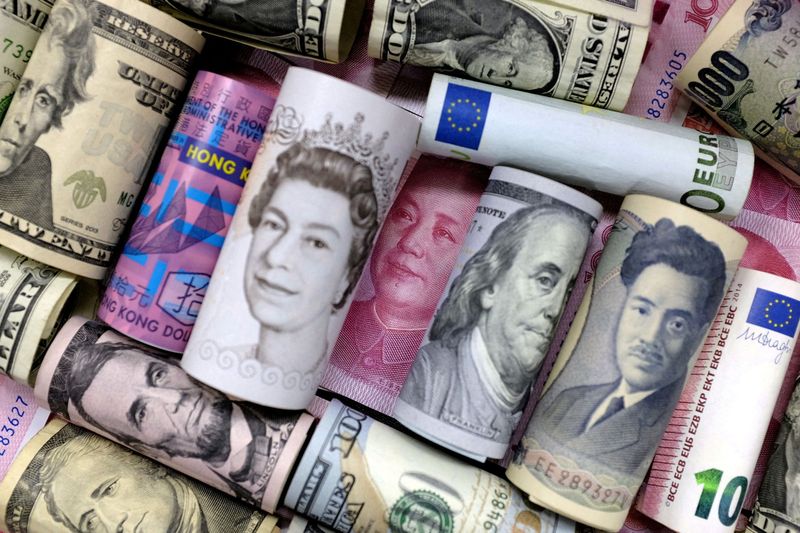 © Reuters. FILE PHOTO: Euro, Hong Kong dollar, U.S. dollar, Japanese yen, pound and Chinese 100 yuan banknotes are seen in this picture illustration, January 21, 2016. REUTERS/Jason Lee
© Reuters. FILE PHOTO: Euro, Hong Kong dollar, U.S. dollar, Japanese yen, pound and Chinese 100 yuan banknotes are seen in this picture illustration, January 21, 2016. REUTERS/Jason Lee
By Kevin Buckland
TOKYO (Reuters) - The dollar was headed for a fifth winning week versus major peers on Friday, ahead of closely watched U.S. jobs report that's likely to back the case for aggressive monetary policy tightening.
The greenback was up for a ninth week against the yen, as benchmark U.S. Treasury yields resumed their climb - topping 3.1% overnight - after a blip lower immediately after the Federal Reserve raised interest rates by half a percentage point mid-week, placing it at the vanguard of hawkish global central banks.
Economists predict a solid 391,000 U.S. jobs were added last month, according to a Reuters poll.
The dollar index - which tracks the currency against six rivals - edged 0.02% higher to 103.59 on Friday, putting it up 0.35% for the week. It touched 103.94 in the previous session for the first time in two decades.
The greenback added 0.22% to 130.46 yen, gaining 0.46% on the week, and taking it closer to last week's 20-year top of 131.25.
The dollar initially dropped back sharply on Wednesday, as Fed Chair Jerome Powell said following the rate hike that a 75 basis point increase is not under active consideration.
But it more than recovered those losses on Thursday, suggesting to analysts at National Australia Bank (OTC:NABZY) that the retreat had more to do with positioning than any change in views.
"Powell was unambiguously hawkish," Gavin Friend, senior market strategist at NAB, said in a client podcast.
"They will do what they have to do to bring inflation to heel," buoying U.S. yields and the dollar, he said.
NAB revised its currency forecasts on Friday, predicting the dollar to strengthen to $1.02 per euro and $1.20 versus sterling by end-September, but easing slightly to 125 yen by that time.
The euro slipped 0.11% to $1.0529 on Friday, keeping it down 0.12% for the week, but the currency has mostly traded sideways since sliding to a five-year trough of $1.04695 last week.
Sterling edged 0.05% lower to $1.23475, off 1.81% for the week. It tumbled 2.22% overnight, the most in two years, after the Bank of England warned of the risk of recession as it raised interest rates by half a percentage point.
Cryptocurrency bitcoin lost 0.84% to $36,225, extending the 7.94% tumble in the previous session, when it touched a low of $35,579.40, a level not seen since late February.
The Aussie dollar retreated 0.27% to $0.7093, but bucked the trend for the week, on course for a 0.52% rally against the greenback - snapping a five-week losing run - after the central bank raised rates by more than expected and signalled further moves ahead.

